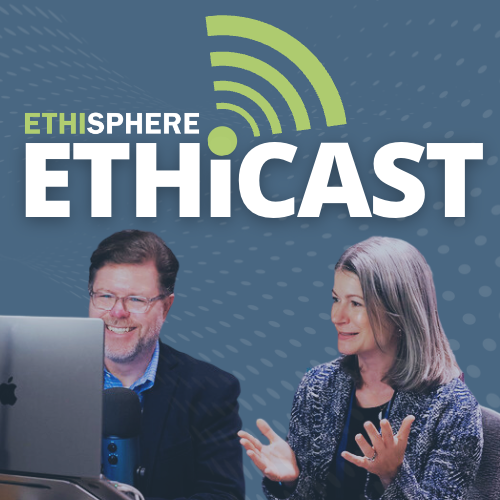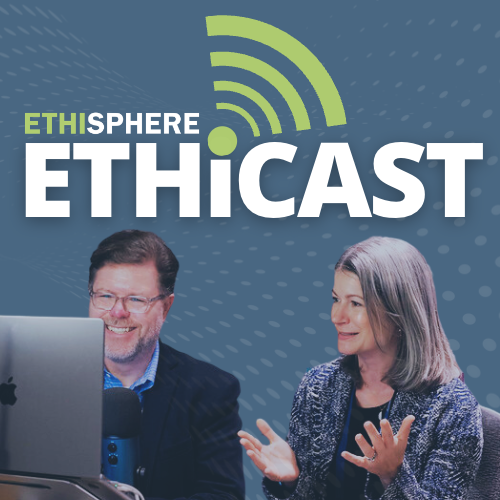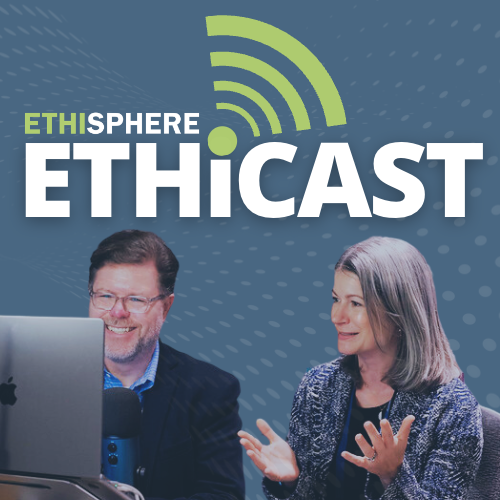[00:00:00] Speaker A: Hi everyone. An embezzlement case of epic proportions shines a light on the importance of internal controls and speak up culture. I'm your host, Bill Coffin and this is another episode of Ethicast Reacts.
Federal prosecutors are seeking a sentence of 18 years for the former Detroit Riverfront Conservancy CFO William Smith for embezzling $44.3 million from the nonprofit over 10 years.
The Detroit Riverfront Conservancy is a 501c3 organization responsible for, quote, the establishment, development, operation, maintenance, security programming and expansion of the Detroit Riverwalk and associated green spaces. Through its public private partnerships, the DRFC will support the development of the riverfront district, facilitate community access to the waterfront, end quote. Its mission is to transform Detroit's international riverfront, the face of the city, into a beautiful, exciting, safe, accessible, world class gathering place for all.
Smith, who has pled guilty to one count each of wire fraud and money laundering, looted the conservancy's treasury to pay for goods and services that only benefited himself, his family and his friends. From November 2012 through November 2024. This includes Get Ready, $3.7 million in wire transfers to his girlfriend on top of jewelry and other gifts, including a $64,000 lease of a Maserati Levante, $100,000 to charter a private yacht for a week long Mediterranean cruise with said girlfriend, another $100,000 for a two day trip to Las Vegas with said girlfriend, $526,000 in various items from Gucci and Louis Vuitton and more than $50,000 to attend a Detroit Lions game. As a Philadelphia Eagles fan, I find that one particularly offensive.
Prosecutors say that Smith covered his fraud scheme by falsifying bank statements that he provided to the Conservancy's auditor, George Johnson and Company, or jgc. The conservancy dropped JGC as its auditor when Smith's fraud was exposed last March after board members questioned Smith over financial shortfalls and found Smith's answers to be evasive.
Citing illness, Smith then stepped down last April. He was charged last May and he pled guilty last November.
With us today to offer some much needed ethics and compliance context around this is Ethisphere Chief Strategy Officer Erica Salmon Byrne. Erica, welcome once again to the program, Bill.
[00:02:29] Speaker B: Thank you so much. You're offended by the football tickets. I'm offended by the Maserati. Let's go.
[00:02:36] Speaker A: Well, look, what are we to learn from the auditor's role in all this? JGC audited the conservancy during the entire length of this fraud. And honestly, when I saw that detail, I was like shades of Arthur Anderson immediately hit. So what do you make of this?
[00:02:49] Speaker B: Yeah, so a couple of things on, on this front, you know, and, and the, the, the publicly available news doesn't tell us whether or not the audit firm rotated audit partners as they're supposed to when you engage in nonprofit audit activity. So we don't know, you know, at what point they sort of lost their independence. But this certainly wouldn't be the first time that something was going on inside an organization that the external auditors figured out, fail to find. So external auditing is not the, is not, you know, sort of a one and done exercise in terms of protecting an organization from fraud. If you have people involved at the very highest levels, and they are the ones that are engaging with the auditors, they can make sure that the auditors don't see what they don't want the auditors to see in certain cases.
[00:03:31] Speaker A: So, Erica, what can we learn about Speak up culture with this? Now, according to the conservancy's 2023 tax form 990, Smith as CFO, was paid $222,000 in salary and another $39,000 in compensation. But the lifestyle he led surely blew well past that money and must have raised a ton of questions. And yet what we had persisted for years. What do you make of that?
[00:03:53] Speaker B: Yeah. Yeah. So, you know, a couple of things come to mind on this one bill.
Anytime you see a CFO involved in this kind of fraud becomes even more troubling because many of the controls that we've put in place assume honesty in the finance function. Right. You know, one of the things that potentially could have, for example, mitigated some of this would be that the, the person signing the contracts and writing the checks wasn't also vetting, you know, the, the vendor agreements. But when you have the fraud in the finance function, those kind of controls become harder to catch.
At the same time, between the other people working at the conservancy and the CEO and the board, I find it very hard to believe that nobody noticed that this guy was living well beyond his means. Right. You can't tell me that he didn't come back from that yacht trip and say to people in the office, oh, my God, this is the most amazing vacation. I just don't buy it. Right. I don't buy it. And so he either had some kind of an explanation for where the money was coming from, or people just didn't feel comfortable asking. And that, I think, is one of the key takeaways. When you, when you have a situation where you have somebody who is in a position of authority signing contracts, engaging with the auditors, who has the ability to obfuscate the financial trail to enable this kind of behavior, it's even more important that the people around them are have an eye out for Indisha that something might be going wrong because this is, you know, this is a guy who is going to be able to, he understands how the systems work, so he's going to be able to work the system.
[00:05:30] Speaker A: Now this whole thing reminds me a bit of New York's infamous Robert Moses, who was just a terrible person who did terrible things.
But among those is he lived like a king on public funds. So how can organizations, especially those that act as stewards for public or donor monies, best use their ENC program to prevent the kind of corruption that we saw with Moses and, and that we're also seeing now with Smith?
[00:05:53] Speaker B: Yeah, I think some of it does go back to those systems of control bill, and making sure that, that they're not too much in the, in one person's hand. So you know, but all of the public records indicate that this particular fraud started small and got got bigger as time went on.
And so what are your contract signing authority rules? Right. Is there a vendor payment point after which you have to have two signatures instead of one? Is there a point in time where the board of trustees or whatever the, you know, name of the board of the conservancy was, where the board looks at the top 10 vendors by spend and quizzes the team on what those vendors were doing for the organization? Right. So some of those kinds of things are the sort of fraud prevention practices that we see well governed, well run organizations put in place. And it's particularly for, you know, the avoidance of situations like this. Now given the fact this was the CFO, if there was a top 10 list, I'm sure he would have been able to rejigger his invoices so that his payments, his fraudulent payments weren't on the top 10 list. But still that same concept of, you know, taking a step back and asking yourself, where are my single points of failure in my control system? Do I have the same person signing a vendor on and approving their invoices? Do I have the same person signing, selecting a vendor and confirming that their work product is appropriate? Do I have, you know, what are my auditing practices in terms of which invoices I'm going to pull and you know, what are my practices for other people to be involved in the audit process. So there were obviously auditors involved in this particular situation. They had been auditing the conservancy audit. The audit. Auditors will often work with the CFO in order to do their audit work. So, you know, I'm sure he was able to kind of guide the auditors away from some of these, these troublesome payments. But you know, the auditor should have been reporting to the board on the audit. The auditor should have been talking to the CEO about the material in the audit. And if they weren't, then I think that's a separate question. But if they were, you know, they, they should, there, there should have become a point in time where some of these things became clear that they just weren't. Okay.
[00:08:08] Speaker A: Now there's a lot that you and I don't know about this story and.
[00:08:10] Speaker B: There'S, there's more we don't know than we know.
[00:08:13] Speaker A: Yeah, exactly. But as I, as I read on this, one thing that kind of came to mind was the length of the misconduct here. And I got the sense that like most things of this ilk, it starts small. But then I think it also kind of, there's probably, I'm sort of speculating here. I imagine there was a critical mass point where he realized, you know what, I haven't gotten caught already, I'm probably not going to be caught. And then things really kind of hit turbo. And that brings me back to the board. Where was the board and all this? And I don't know what their board rotation looks like, but I think there's a non zero chance that when the board started asking heavy questions about this, I wonder to what degree can we thank new board members for bringing fresh eyes on this? And again, I don't know if that actually happened or not, but it made me think about the value of board rotation, this sort of thing, not just for better leadership, but also to help perpetual cases of fraud get discovered.
[00:09:05] Speaker B: Yeah, I think it's a really good point, Bill. And it's part of the reason why if you look at some of the UK's rules around public companies governance, you can't be considered an independent director after you've been with the organization for nine years. Right? @ that point you are considered to be so in bed with the management team, you've delivered, you've developed such great relationships, you worked so long together, you've worked so hard together, you can't be fresh eyes, right? You're, by definition you are no longer independent after that nine year period. And I think it's a really good rule of thumb, right, to be whether, whether you're a nonprofit organization. You, you know, you're, you're a privately held company, you're a publicly held company. Really thinking about that question of how do I make sure that I have enough people coming in to my organization that they're going to ask the kind of challenging questions that we need from a governance perspective.
Now, nonprofits like the conservancy are hard because those boards are often donor boards. You know, they're often people who have, who have given a lot of money to the organization or who are otherwise invested in the work. And so it can be hard to refresh that board with people like that, you know, depending upon your donor pool. At the same time, I think it's still a worthy exercise to say, can I rotate committee memberships? Like, what can I do to keep this fresh so that if there is something sketchy going on inside the organization, I haven't, I have more than an, than a zero chance of catching it.
[00:10:32] Speaker A: Well, you hate to see something like this happen to a beautiful city like Detroit. The people there certainly deserve better. But hopefully this will come to closure soon and the conservancy can get back to the future. Fine work it's doing. In the meantime, Erica, thank you so very much for joining us and helping us understand the context around this particular story.
[00:10:48] Speaker B: Yeah, absolutely, Bill, my pleasure. And I hope that everybody out there listening, you know, if, if this is a fact pattern that resonates with you, that you take this and, and use it with your team and say not could it happen here, but how could it happen here and then get to work making sure that it doesn't.
[00:11:06] Speaker A: For plenty of helpful resources around anti corruption, anti bribery, and speak up culture, be sure to visit the Ethisphere resource
[email protected] resources. I'm Bill Coffin and this has been the Ethicast. For more episodes, please Visit the Ethisphere YouTube
[email protected] ethisphere and if this is your first time enjoying the show, please make sure to like and subscribe on YouTube, Apple Podcasts and Spotify. Thanks so much for joining us. And until next time, remember, strong ethics is good business.
Sam.


